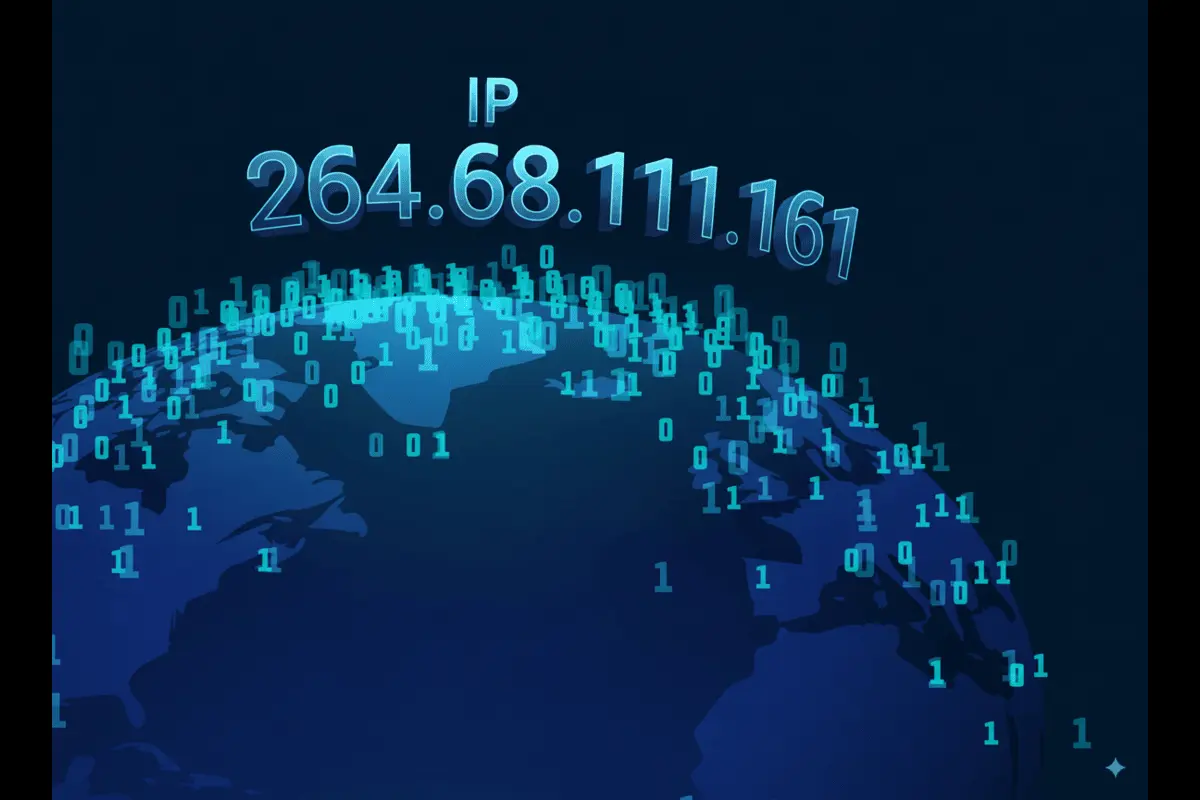The world of cybersecurity is vast and complex. At its core lies the concept of IP addresses. These unique markers are important for device communication.
Among them, 264.68.111.161 stands out as a mystery. It intrigues many due to its unusual format.
Knowing how IP addresses work is essential for online safety. They play a big role in directing traffic and keeping data safe.
This article explores the significance of 264.68.111.161. We will unravel its implications in cybersecurity.
Introduction to IP Addresses
IP addresses are the backbone of internet communication. They uniquely identify devices on a network. Each device has a distinct number to route information accurately.
Consider IP addresses as digital addresses for devices. They enable precise data flow across the internet. Here’s how they work:
- Identify devices uniquely
- Aid in data routing
- Ensure efficient network operation
It helps explain larger network safety concerns.
What is an IP Address?
An IP address is a numerical label for devices in a network. It identifies both the host and its location.
How IP Addresses Function in Networks
IP addresses keep information moving between devices. They ensure data packets reach the correct destination efficiently. This step is fundamental to network operations.
The Structure of IPv4 Addresses
IPv4 addresses consist of four octets. Each octet ranges from 0 to 255. This system supports about 4.3 billion unique addresses.
Understanding this format is crucial. It helps in network configuration and troubleshooting. Here’s how they are structured:
- Four octets separated by dots
- Each octet is a number from 0 to 255
- Represents both network and device identifiers
These numbers help determine network boundaries and device identity within those networks.
Subnet Mask Explained
A subnet mask divides an IP address into network and host portions. This division improves network efficiency. Subnetting allows better IP address allocation.
Benefits of subnet masks include:
- Enhanced network safety
- Efficient IP address management
- Improved network organization
Using subnet masks helps manage large networks by isolating sections.
Understanding 264.68.111.161 Format
The IP 264.68.111.161 doesn’t conform to IPv4 standards. Each octet in IPv4 must not exceed 255. Hence, 264.68.111.161 is invalid due to the first octet.
Why 264.68.111.161 is Not a Valid IP Address
The address 264.68.111.161 cannot exist in IPv4 standards. Each segment of an IPv4 address must remain within the range of 0 to 255. Thus, the ‘264’ in the first octet disqualifies it as a legitimate IP address.
Knowing these limits is important for safe networking.
Common issues with invalid IPs include:
- Misrouted data
- Network conflicts
- Weak points that attackers can exploit
Address validation helps maintain a strong and secure network infrastructure.
The Implications of Invalid IP Addresses in Online Security
Invalid IP addresses can create serious risks. They might be exploited by attackers to bypass defenses. Network settings must be accurate to avoid these issues.
Consequences of using or encountering invalid IPs include:
- Unauthorized access
- More exposure to attacks
- Troubleshooting difficulties
Correctly set IPs enhance network integrity. They reduce the risk of unauthorized entries and data breaches. Knowing these points is key to keeping networks strong.
When and Where to Perform an IP Address Lookup
Looking up an IP address can reveal the source of suspicious activity.
This step helps check for weak spots and possible risks.
Regular checks help spot unauthorized access fast.
Businesses should run IP lookups during audits. When unusual traffic patterns emerge, it indicates a need. Acting early helps block intrusions before they happen.
Tools for IP Address Looku
Various tools facilitate efficient IP address lookups. Each serves distinct purposes and environments.
- WHOIS databases
- Online IP lookup services
- Network monitoring tools
They give useful insights into where an IP address comes from and who owns it.
Interpreting Lookup Results
After performing a lookup, understanding the results is vital. These results reveal IP ownership, geographic location, and ISP details. Spotting patterns makes it easier to detect threats. Odd patterns in data often point to security problems.
The Role of 264.68.111.161 in Online Threats
The odd IP 264.68.111.161, though invalid, may still show up in logs from errors or attacks. An invalid address like this could be part of a spoofing attempt to hide its true origin.
Attackers often exploit invalid IP addresses in various ways. These include:
- IP spoofing
- DDoS attacks
- Phishing campaigns
Understanding these risks is crucial. Such insights improve your network’s defense strategy. Fixing these problems quickly reduces safety risks.
Protecting Your Network Against Invalid IPs
Protecting your network from invalid IPs like 264.68.111.161 needs careful management. Making sure settings are correct and keeping an eye on traffic helps stop threats. Regular audits help in identifying any wrongly set IPs.
Consider implementing these strategies:
- Install robust firewalls
- Use network monitoring tools
- Update security protocols regularly
Addressing these aspects significantly boosts your network safety.
Best Practices in Network Security
Keeping a network safe means following best practices that adapt to new threats. Start by building a security-first mindset in your team.
Include these practices:
- Conduct regular security training
- Implement access controls
- Utilize encrypted communications
Staying proactive enhances your network defenses. These steps get your team ready to handle issues with confidence.
Conclusion
Knowing how IP addresses work is essential for online safety. Understanding the limits and implications of invalid IPs like 264.68.111.161 protects networks. Stay informed to fortify your digital defenses.
FAQs
What is an IP address?
An IP address is a unique string of numbers. It identifies a device on a network. This identification is crucial for routing data.
Why is 264.68.111.161 invalid?
The IP address 264.68.111.161 exceeds valid octet values. Each octet should be between 0 and 255. This makes it an invalid IPv4 address.
What is a subnet mask?
A subnet mask divides an IP address into the network and host parts. It helps assign IP addresses in a network more smoothly.
How do IP address lookups work?
IP address lookups identify details about a specific address. This includes location and the service provider. Such tools enhance network analysis.
Can invalid IPs cause security risks?
Yes, invalid IPs can lead to errors. This may create weak points. Good management keeps the network reliable.














